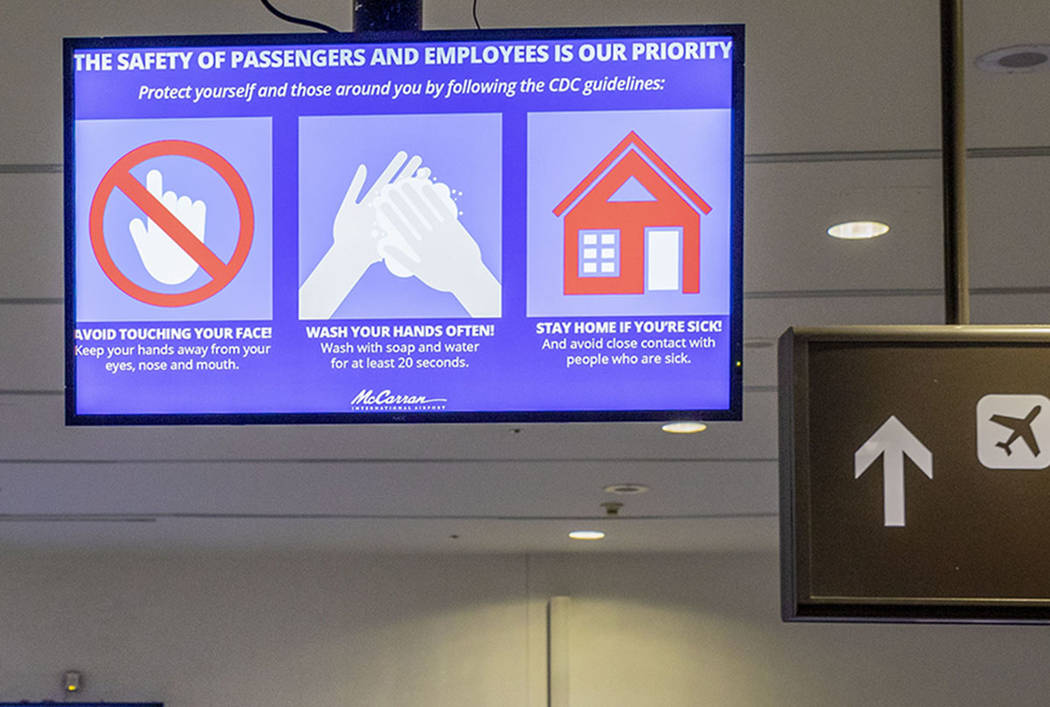Canceling that spring trip due to coronavirus? You’re not alone
After writing about Las Vegas-based Allegiant Air and its no-fee deal, the Road Warrior turned into a de facto customer service rep for the airline.
With my email and desk phone number at the bottom of the story, there was a flood of calls and emails (around 200 total) lasting well into Friday morning as this column is being written, mistaking me for a representative of Allegiant.
Waking up Friday morning to over a dozen emails and sitting down at my desk to 83 voicemails, I was made aware that Americans are in no mood to travel during what the World Health Organization labeled a pandemic. I got back to as many readers as I could, giving them best advice passed on to me by Allegiant.
There are many reasons those wishing to alter their travel plans provided for wanting to no longer fly.
All of course related to coronavirus. Many are elderly and mention being in the high risk zone for contracting the virus, while others were canceling family trips.
“Me and my family are scheduled to vacation in Florida March 29-April 2 for spring break, due to illness spreading we would like to cancel,” Yolanda Milam said in her email.
No matter what the reason, it is evident that if I’m getting flooded with such requests, Allegiant and other airlines are seeing a much higher volume of requests.
The effect is also expected to hit home in the Las Vegas Valley, as several large conventions and events have been either canceled or postponed. And with the NCAA’s decision to call off this year’s basketball tournaments, Las Vegas will see one of its busiest weekends deflated.
McCarran International Airport officials wouldn’t provide specific passenger numbers, as airlines don’t submit those until late in a month and then are provided weeks after.
But their 11-month streak of breaching 4 million-plus passengers is in serious jeopardy.
If it doesn’t dip in February’s numbers, as the real panic from the new coronavirus didn’t start in the United States until late in the month, March’s number are almost certain to be drastically lower because of the canceled events and international travel ban enacted by President Donald Trump.
It appears to be turbulent times ahead for the travel industry, and instead of looking forward to reaching new heights, the industry is bracing to see how low it can go before recovery begins.
“These are certainly unprecedented times for our airline, our flight attendants and our country,” Lori Bassani, president of the Association of Professional Flight Attendants, said in an email. “I experienced 9/11 from the inside as our Union’s PR and media consultant and I can tell you that as shocking and traumatizing as that event was, I believe this crisis is much more pervasive and far-reaching and our lives will once again be changed in unimaginable ways.”
Airport travel tips
The Transportation Security Administration reminds travelers that it already has protocols that have been used long before the coronavirus outbreak, according to TSA spokeswoman Lorie Dankers.
Current TSA standard operating procedure requires frontline personnel to wear nitrile gloves when screening people or their property, adding an additional layer of protection. Gloves are changed after contact with passengers or their property.
Any swabs used in a screening procedure, whether checkpoint and checked baggage, are not reused for other passengers. The TSA has authorized frontline personnel whose security screening tasks require them to routinely come into close contact with the traveling public to wear surgical masks at their choosing.
Tips for passengers include:
— Do not place personal items such as wallets, keys or phones in a bin. Instead, secure them in carry-on property to be screened through the X-ray system. With hundreds of travelers going through an airport security checkpoint each hour, the bins are a commonly used item.
— Travelers are allowed to bring individually packaged alcohol or anti-bacterial wipes in carry-on or checked luggage. Jumbo containers of hand wipes are also allowed in carry-on or checked luggage. Liquid hand sanitizers must adhere to the TSA’s liquids limit of 3.4 ounces. Bottles larger than 3.4 ounces should travel in checked luggage.
— The TSA also encourages all travelers to follow the Centers for Disease Control and Prevention travel and prevention guidance regarding the coronavirus.
Send questions and comments to roadwarrior@reviewjournal.com. Please include your phone number. Follow @mickakers on Twitter.











































